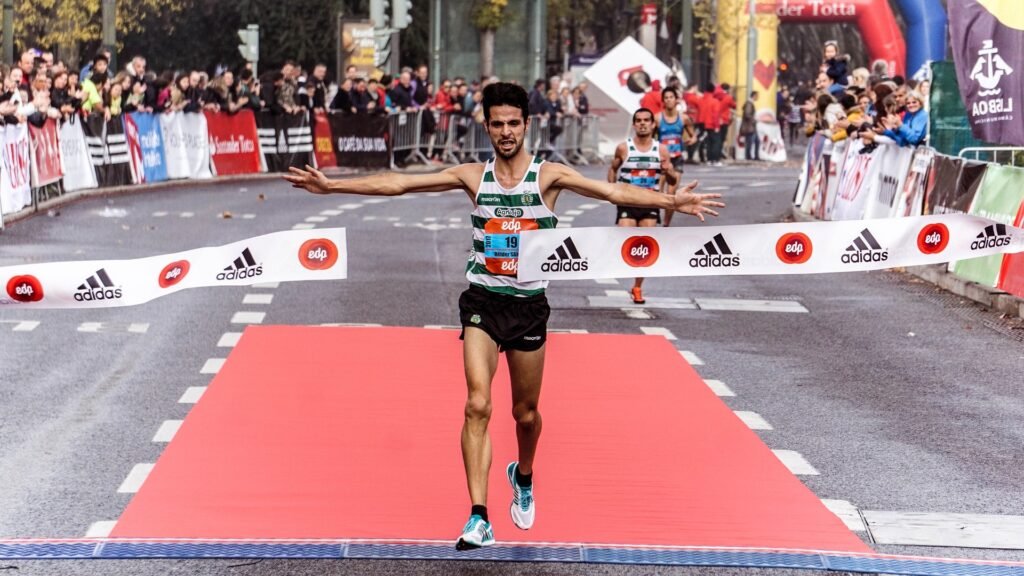Here’s a really common question among new runners: Is running on an empty stomach a good idea?
The answer is going to vary a little depending on what your goals are in running. But generally speaking, it’s usually not a bad idea to run on an empty stomach, and quite often it can turn out to be a good idea.
Let’s talk about why that is.

Why Are People Worried About Running on an Empty Stomach?
First, it might help to think about why people ask this question in the first place. What are they afraid of?
There’s a common misconception out there that runners need to eat a ton of carbs. If they don’t, they’ll suffer. People have this image of runners needing to “carb load” in order to run.
There’s also a very real phenomena in marathon runners called “bonking” or hitting the wall. At a certain point in the race, if they haven’t managed their nutrition properly, they just seem to run out of fuel. Their pace drops, and they struggle through to the end.
The good news is that you don’t need to carb load. In most cases, you probably also don’t need to worry about bonking.
Where Does the Body Get Fuel for Running?
To understand both of these things, it will help to understand how the body fuels the act of running – or any other endurance activity.
To put things in simple terms, the body has two main sources of energy: sugar and fat.
The sugar is stored in the muscles as something called glycogen. When the muscles need this energy, they take out this glycogen and break it down into simple sugars – glucose.
The body has a limited store of glycogen. Let’s say the average adult can store 400g of glycogen in their muscles. Each gram of glycogen contains about 4 calories of energy – a total of about 1,600 calories of energy.
The fat is stored throughout your body as, well, fat. Each gram of fat contains approximately 9 calories of energy. The amount of fat is going to vary from individual to individual – much more than the amount of glycogen.
Someone who is in “good shape” might have 15% body fat. For a 176 pound man (80 kilograms), that’s about 12,000 grams of fat – or about 108,000 calories of energy.
The bottom lime is that the body has a virtually limitless supply of energy stored as fat and it has a much smaller amount of energy stored as glycogen.
But How Does the Body Decide What to Use?
At any given moment, your body is probably using a combination of the two forms of energy. But this will vary a great deal.
When your body is at rest or exercising at low intensities, your body will dive into the fat stores and burn a few grams. At higher intensities, the percentage of glycogen used for energy increases dramatically.
If you’re running at a quick pace – think 5k or so – you’re probably burning mostly glycogen and very little fat.
The glycogen is “easier” for the body to access, but your body also knows that it has a limited amount. So this energy is stored and reserved for when you need a quick hit. Otherwise, your body is happy to chug along burning fat.
In fact, if you were to fast for a day or two, you’d mostly use up your stored glycogen. And your body would keep going. If your glycogen tank is empty, the body just shifts gears and makes due just fine with fat.
The main downside here is that you will not be able to sustain the same intensities as you were before. You can keep going at moderate to low intensities, but if you’ve wiped out your glycogen stores you’re not going to be able to run a 5k and hit a new PR.

So When Is It Good To Run On an Empty Stomach?
There are two main reasons you’d want to do this.
First, there’s the training aspect. The way your body utilizes and stores energy is not set in stone. By training your body, you can impact the amount of glycogen your body stores. You can also train your body to shift the percentages so that it uses more fat at a given intensity.
If you’re running short races, like a 5k, this may not really matter. You just aren’t running long enough to burn through your glycogen stores in a race. In a well trained runner, you should be able to run close to two hours before your glycogen stores run low.
But if you’re training for a marathon this matters a lot. No matter how much you eat, you’re not going to have enough energy stored up for the entire race. You’ll have to take in some energy throughout the race. Training your body to store more glycogen and use it more efficiently will reduce your need to rely on supplemental nutrition.
Then, there’s the weight loss aspect.
When your body is low on muscle glycogen, it prefers to burn fat. By running on an empty stomach, you’re going into a run with lower stores of glycogen. As a result, your body will prioritize the fat stored in your body and burn it – instead of the sugar in your muscles.
Over a long period of time, it may not matter much. If you’re in a calorie deficit, you’ll eventually burn the fat and lose the weight. But in the short term, if you’re constantly fueling with glycogen and then burning it all, you’re going to see a lot of ups and downs in your weight.
And in the short term if you’re never burning through those glycogen stores, you may never be touching the fat stores.
So When Is It Not Good to Run On an Empty Stomach?
It’s great from a training perspective and weight loss perspective to run on an empty stomach. It’s not great from a performance perspective.
If you’re running a race, you want to make sure your fuel is topped off. The longer the race, the more important this is.
You should eat the night before. You don’t have to go crazy with carb loading, but a good meal with a decent helping of carbs should be sufficient. Then some kind of light meal in the morning will help replace what you burned throughout the night.
But practically speaking, if you’ve fueled up the night before you could probably run a 5k or a 10k just fine without anything to eat.
The other time you’ll want to eat before your run is to literally practice eating before you run. If your ultimate goal is to run a marathon, you know that nutrition is important. This will likely mean eating something for breakfast before your race and eating something during the race.
If you’re not used to it, this can really mess with your digestion. And no one wants to have an upset stomach while they’re running.
So while you should definitely do some of your long runs in a fasted state to help train your body to use glycogen more efficiently, you should also practice eating before and during running so you can train your body to digest that food more easily.

The Bottom Line on Running on an Empty Stomach
At the end of the day, you should not be afraid of running on an empty stomach. I almost always run on an empty stomach, and it’s never been a problem.
Keep in mind what you’re trying to achieve, and that should guide you. If you’re training, especially for a longer event, you should definitely spend some time running on an empty stomach. And if you’re trying to lose weight, you shouldn’t be eating anything you don’t need to.
On the other hand, if performance is the most important thing – like a race or a key workout – it makes sense to go into it well fed. You should definitely eat enough the day before that you’re more or less topped up. And a small snack the morning of won’t hurt – as long as your body is used to it and can digest it easily.
What’s your experience been? Do you regularly run on an empty stomach? How has that worked out for you?
